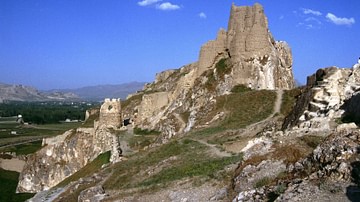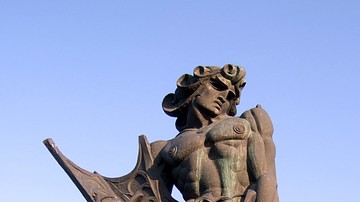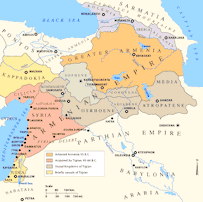Search Definitions
Browse Content (p. 185)

Definition
Ancient Olympic Games
The ancient Olympic Games were a sporting event held every four years at the sacred site of Olympia, in the western Peloponnese, in honour of Zeus, the supreme god of the Greek religion. The games, held from 776 BCE to 393 CE, involved participants...

Definition
Mavia
Mavia (r. c. 375-c. 425 CE) was a warrior-queen of the semi-nomadic Tanukhid Arab tribe of Syria and Jordan who led a successful insurrection against Rome in 378 CE. She is also known as Maowiva, Mu`awiya, Mauia, Mania, and Mawiyya. Her control...

Definition
Tushpa
Tushpa, later known as Van, was the capital of the Urartu kingdom of ancient Armenia, eastern Turkey, and western Iran from the 9th to 6th century BCE. Located on the eastern shore of Lake Van in modern Turkey, the city was a fortress site...

Definition
Armenian Mythology
The mythology of ancient Armenia is a rich blend of indigenous traditions with imported ideas from neighbouring cultures and migrating peoples added over the centuries. The legends and stories helped to explain natural phenomena, provide...

Definition
Tigranocerta
Tigranocerta (Tigranakert) was a city in the southwest of ancient Armenia founded and made capital by Tigranes the Great in 83 BCE. Famous for its riches and fine buildings, as well as its mix of Hellenistic and Persian culture, the city...

Definition
Oedipus at Colonus
Oedipus at Colonus was the third play of the Oedipus trilogy written by the great Greek tragedian Sophocles (c. 496 - c. 406 BCE). Although written in the years prior to his death, it would finally be presented by his son Iophon at a dramatic...

Definition
Aethelflaed, Lady of the Mercians
Aethelflaed (r. 911-918 CE) was the daughter of King Alfred the Great of Wessex (r. 871-899 CE) and became queen of Mercia following the death of her husband Aethelred, Lord of the Mercians (r. 883-911 CE). She is best known as the “Lady...

Definition
Illuminated Manuscripts
Illuminated manuscripts were hand-made books, usually on Christian scripture or practice, produced in Western Europe between c. 500-c. 1600. They are so called because of the use of gold and silver which illuminates the text and accompanying...

Definition
Ancient Armenia
Ancient Armenia, located in the south Caucasus area of Eurasia, was settled in the Neolithic era but its first recorded state proper was the kingdom of Urartu from the 9th century BCE. Incorporated into the Persian Empire of Cyrus the Great...

Definition
Kingdom of Nabatea
The Nabatean Kingdom was a powerful political entity which flourished in the region of modern-day Jordan between the 4th century BCE and c. 106 CE and is best known today for the ruins of its capital city of Petra. Although it is clear that...